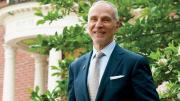The Close: A Young Woman's First Year at Seminary, by Chloe Breyer '91 (Basic Books, $24). Breyer grew up in Cambridge in an interfaith, secular household, the daughter of an American Jewish father (and U.S. Supreme Court justice) and an English Anglican mother. A fighter for societal change, she founded Who Cares, a publication for people working in public service and community activism. Then she chose to become an Episcopal minister. Why? She explains in this memoir of her first year at General Theological Seminary in New York City.
Today I Am a Boy, by David Hays '52 (Simon & Schuster, $23). So, at the age of 66, Hays says to his rabbi that he is thinking more and more about studying to be a bar mitzvah. "Great! Hebrew is an easy language," says the rabbi. "Just 22 letters." Hays soon finds himself in a tiny classroom with eight rowdy 12-year-olds, whom he calls the Hormone Hurricanes, embarking on a great adventure, reported here with feeling. Hays is coauthor with his son of My Old Man and the Sea, which tells how they sailed a small boat around Cape Horn. When he worked for a living, Hays senior was set and lighting designer for more than 50 Broadway plays and musicals, 30 ballets for Balanchine, and many operas at the Met. He also founded and led the National Theatre of the Deaf (see "Conversation: David Hays," Harvard Magazine, September 1976, page 48).
New England Forests through Time: Insights from the Harvard Forest Dioramas, by David R. Foster, director of the Harvard Forest, and John F. O'Keefe '67, coordinator of the Fisher Museum of Forestry (Harvard Forest, distributed by Harvard University Press, $9.95, paper). In the museum at the Harvard Forest in Petersham, Massachusetts, are 23 large dioramas showing how that land looked at various periods during the past 300 years. This book displays all the dioramas in color for the first time, and the accompanying text interprets the environmental drama they exquisitely depict. Today, one sees, the region is in many ways more natural than at any time since the Revolution.
Archimedes' Bathtub: The Art and Logic of Breakthrough Thinking, by David Perkins, codirector of Project Zero at the School of Education (Norton, $24.95). How do breakthroughs occur? Perkins has a theory, and he offers dozens of mind puzzles to illustrate it, viz., "you have 10 matches to work with....The challenge is to arrange them into two squares of different sizes, using all the matches. No breaking of matches is allowed."
George Perkins Marsh: Prophet of Conservation, by David Lowenthal '44 (University of Washington Press, $40). Marsh (1801-1882) had a many-sided engagement with life as a linguist, lawyer, congressman, and diplomat. He wrote pungently and provocatively on topics ranging from camels to corporate corruption and produced the seminal Man and Nature, a politically powerful call for the repair of nature. Harvard asked him to chair the history department, but Marsh, fearing penury, said no; Harvard gave him an honorary LL.D. The author of this fat, learned, sparkling biography, an American, is professor emeritus of geography at University College London.
Passing Game, by Christopher Brookhouse (Safe Harbor Books, $19.95, paper). Two friends return to Harvard after World War I, room together, play football on the team that went to the Rose Bowl, and discover each other's secrets in this novel evocative of a College era decidedly earlier than today's.
Adam's Fall, by Sean Desmond '98 (St. Martin's Press, $22.95). The protagonist of this novel is a resident of the haunted B-entry of Adams House. Although he has a thesis to write, a Marshall to apply for, and a girlfriend to elude, he spends much of senior year struggling to discover the identity of the ghost--result, a well-told losing of the mind.
The Fine Green Line: My Year of Adventure on the Pro-Golf Mini-Tours, by John Paul Newport '76 (Broadway Books, $24). The author, a freelance journalist, left home and hearth to spend a year competing in the pro-golf minor leagues--on the Hooters Tour, for instance. He exposes golf's underbelly--and explicates the fine green line that separates the best golfers from all the rest. "The primary cause of golf's maddening addiction," he confesses, "is that every golfer knows for a fact that he or she is actually much, much better than his scores would indicate."





